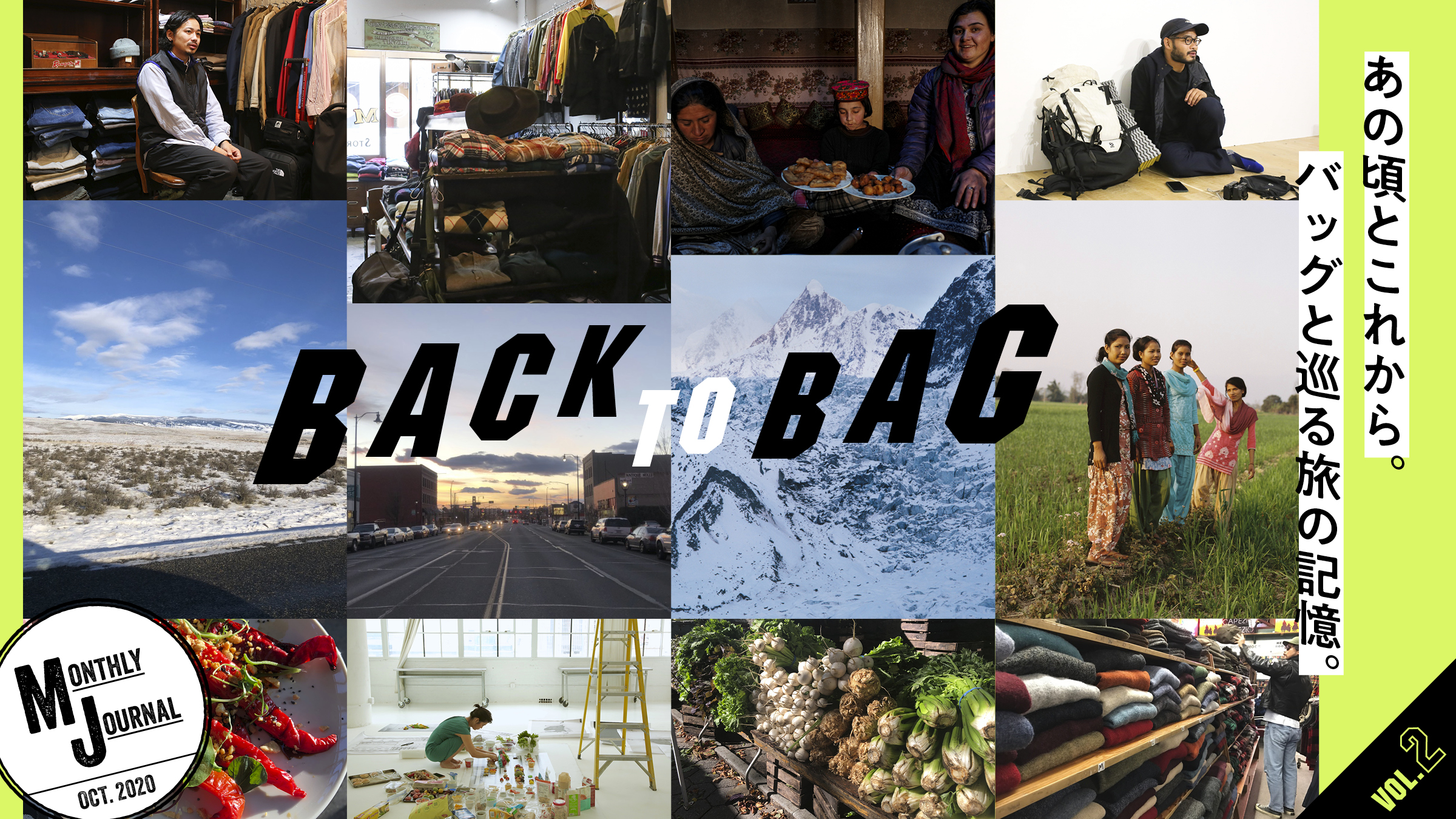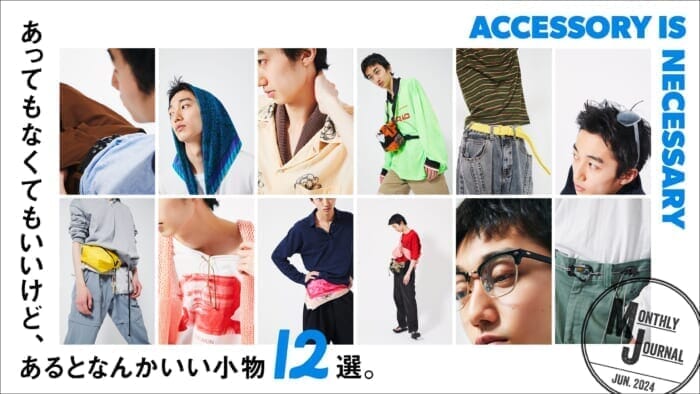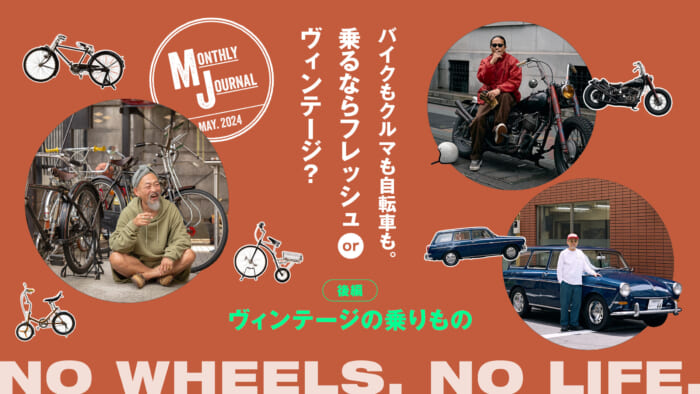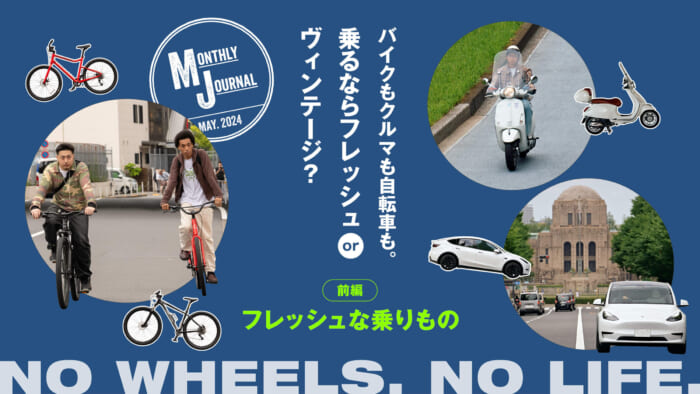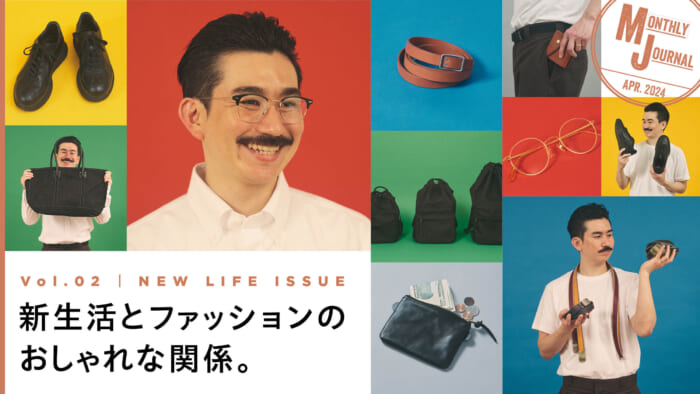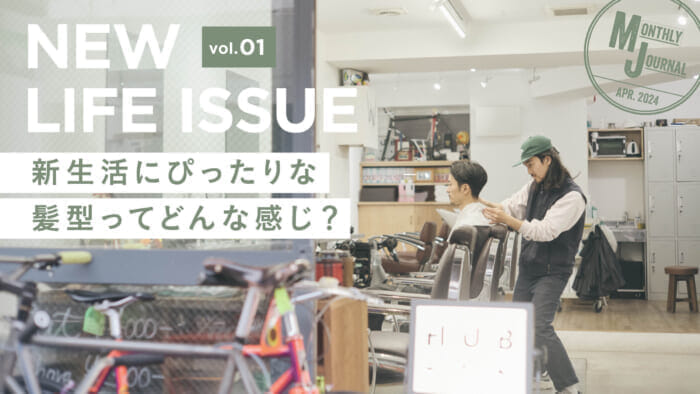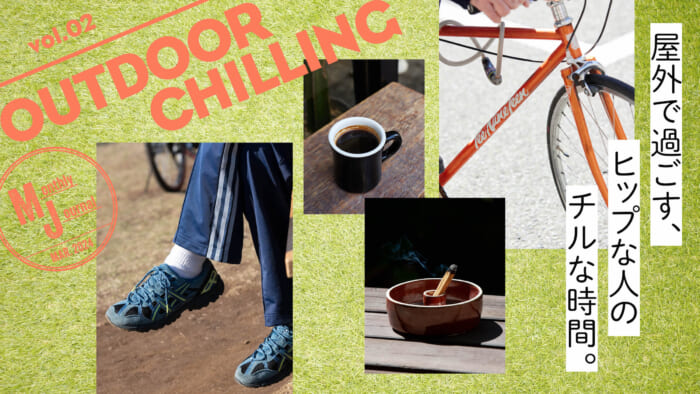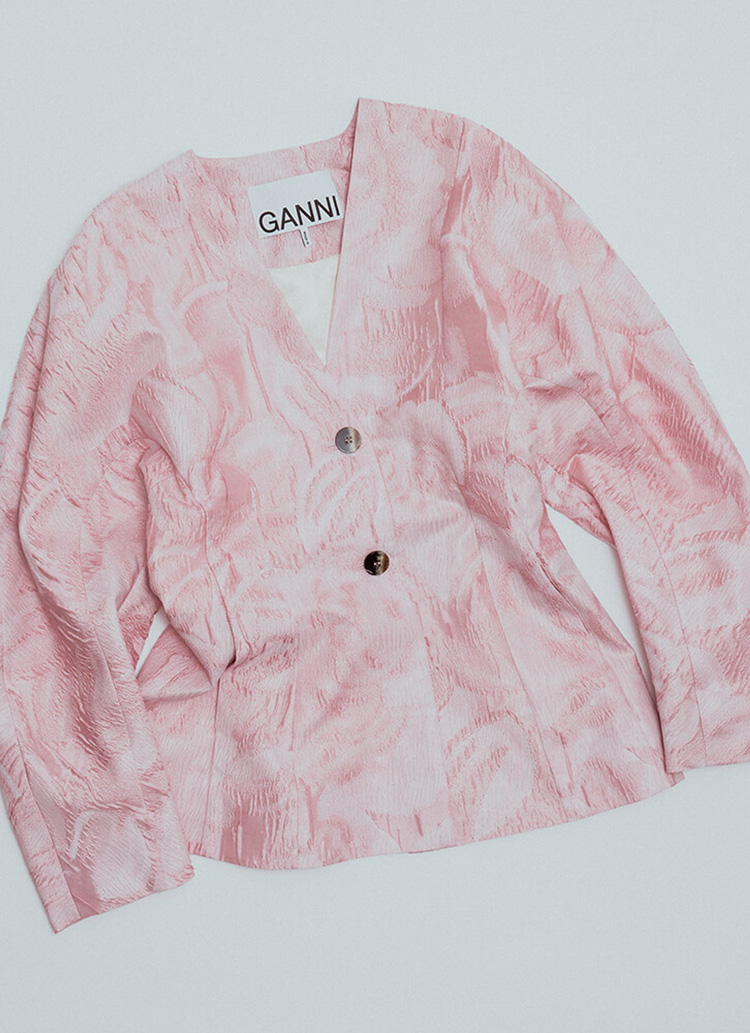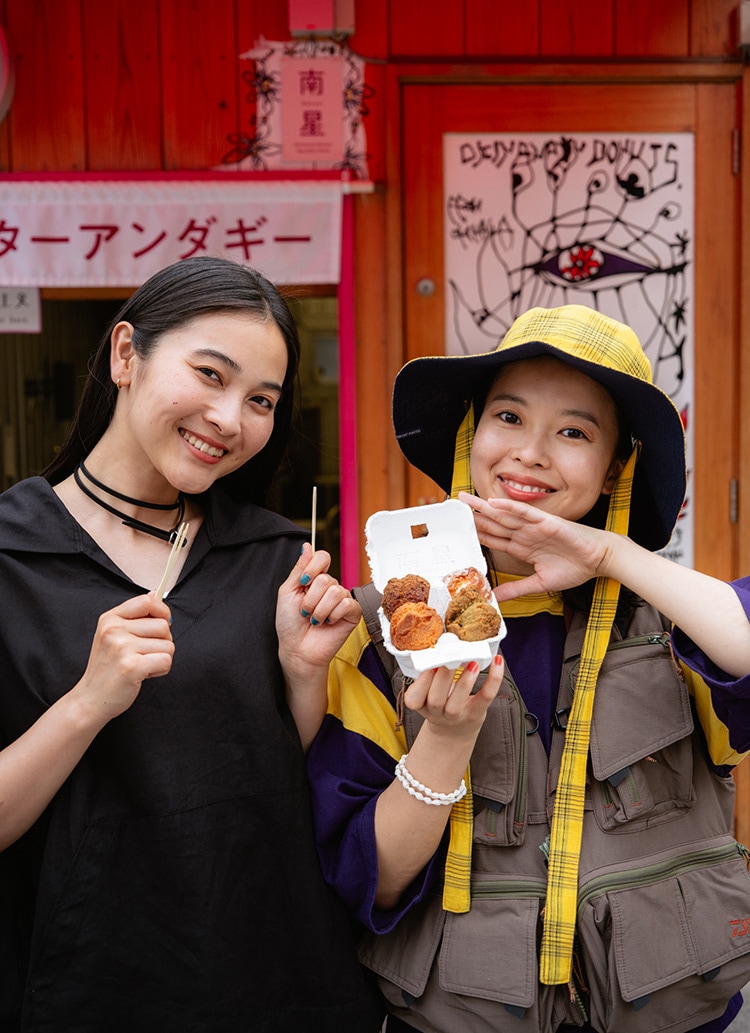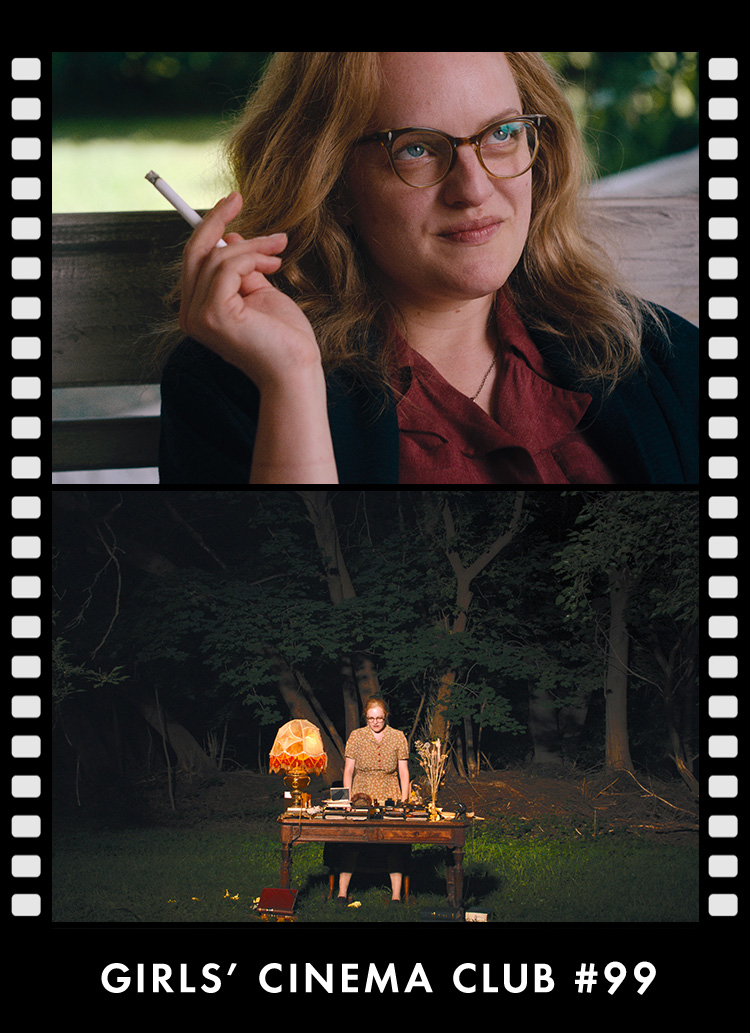02 Food Director and New York.

PROFILE
A food director who has worked extensively in commercials, advertisements, magazines, and other media. His "Food On A Photograph," in which vegetables and other ingredients are placed on top of black-and-white portraits, has attracted attention, and his art x food activities, such as holding solo exhibitions, have become the talk of the town. Click here to learn more about her roots, including how she became interested in food.( A person who lives for the feast. Food Stylist, Leader of "Dress the Food" Kaoru )from the article.
www.dressthefood.com
instagram@dressthefoodkaoru
Travel bag bought on the road.

On board the plane, he will bring a bag from the Danish rainwear brand "RAINS.
Where does this bag hold memories of your travels?
Kaoru: It's almost always New York. I would even go so far as to say that in recent years, I have been fixated on New York. I want to do my best in New York, so I have been going there at least twice a year for the past few years. I bought this bag from Raines when I was returning to Japan because I couldn't fit my luggage in it.
Were there any criteria for your choice?
Kaoru: It holds a lot, is lightweight, and the zipper is waterproof, so it won't get caught if you toss it around when you move. The staff at the store in Soho is a nice guy, and he came to my first exhibition in New York. He was a street person, so he showed up and said "Yo congrats! )" and then he left immediately after shaking hands with me (laughs). It's a culture that says it's important to show up.

How do you use the bags after that?
Kaoru: I often buy tableware to bring back home, and I bring huge pieces of tableware with me on the plane. This is a piece by my friend and ceramic artist Shino (Takeda) from New York, and it was a privilege to visit her over there. She doesn't sell her large works in Japan, and they are heavy, so putting them in my checked luggage would be overweight. Above all, it is unthinkable that she would break such an important piece (laughs). So, I wrap the vessels around my clothes, put them in this bag, and take them back home very carefully.
When did you start going to New York?
Kaoru: I started going there regularly about 4 or 5 years ago, and I wanted to learn more about the food scene overseas. Over there, I am put in the field by some of the top food stylists in the world. It's usually in the spring and fall, and I ask her, "I'm thinking of going this time of year, can you put me in the field?" and if she responds with something like, "There are several sites available," then I would go at that time. I prioritize her shoots and use the other time to visit the places and meet the people I want to see.
Travel bag bought on the road.

ALEXA" is one of the "Food On A Model" series presented in 2019.
Do you have any particular reason for choosing New York?
Kaoru: The aforementioned famous food stylist is the one who worked with photographer Irving Penn on the food page of Vogue for about 10 years. She reposted my "Food On A Photograph" piece on Instagram one day. So, New York, I guess. I decided to assume that I might be invited (laughs). That's when I started obsessing about New York. I sold my zines to bookstores and such during my first visit, and I gradually developed relationships in New York, but I didn't want to let that network of contacts die out.
It is unusual for you to keep going to the same place.
Kaoru: I had the experience that New York is most likely to be interested in you when you meet for the first time. The editors and other people I met asked me a lot of questions. But when I went to say hello to them a second time, they were like, "What are you doing here this time?" I was always asked to bring something new to the table. Whenever I am not busy in Tokyo, I think about when I am going to New York again, and I think about what I need to do before then, or I need to work on my book production properly. By making going to New York a routine, it has become a place where I can maintain my relationships with people and my motivation, so it may be more like a training exercise than a trip.

The 2018 work "Watch out!

Fresh On Set, a piece I created in New York City in 2018.
I think that even if you are going to New York, there is a difference between a trip for relaxation and a trip to challenge yourself like Ms. Kaoru did.
Kaoru: That's right. The other big thing was making local friends. I have made friends with people of all ages and genders, including old men and children younger than myself. Everyone has a different way of thinking, and I am looking forward to experiencing conversations and ways of perceiving things that are completely different from what I am used to in Tokyo. Food, friends, and work are the three reasons why I go to New York.
How long do you stay in New York at a time?
Kaoru: At least a little over two weeks. If I don't stay at least two weeks, I can't respond to job offers from people I meet in the area. In some cases, I stay for less than three months, just before my visa expires.
Farmers' Markets, Relationships.

If it weren't for the Corona disaster, I would be in New York right now.
Kaoru: I was going to go there for the right reasons.... Just at the end of the summer and into the fall, the farmers' markets are switching between summer and fall produce, moving from the colorful tomatoes characteristic of the other side of the country to the apples of fall. It is interesting to see the ingredients at the farmers' market.

Kaoru: At farmers' markets in New York City, you can see produce that looks as if it has been brought straight from the fields, with all the leaves still attached and in season! You can see the ingredients in all their glory, with all the leaves still attached. I feel more connected to the producers. I can buy some food at the farmer's market and have lunch at the park, or I can buy some of the produce and cook it today instead of hoarding it. Fish, meat, cheese, and bread are all available at the farmers' market, so I can buy them while consulting with the producer.
Do you often go out to eat at restaurants in New York?
Kaoru: I do a lot of research and trust the information I get from people I meet there who share my taste buds. I also check out restaurants that use ingredients from my favorite farmers' markets. The range of ethnic food is wide, so Greek and Middle Eastern food is also very good. Also, many of the restaurants are very good at using spices.
Where do you stay when you are there?
Kaoru: I have been staying at a friend's house. At first I used "Airbnb," but it was expensive. One time, I stayed on the third floor of a building in Brooklyn and made great friends with the people on the second floor. They are an American wife who is a designer for a Japanese brand and her husband is an English photographer, and when they came to Japan, I was able to stay there in turn. That is the best way for me to stay with them now.
It's a relationship that you don't hear much about in Japan.
Kaoru: I think this is something that can only happen in New York. When you become friends with someone, you invite them to your house and ask them to introduce you to their friends. It is common in New York for people to invite others to their homes, and when they are invited to a party, there may be people they don't know there, or they may become friends with someone who happens to be there by chance.
Kaoru's friend in New York. She interacts with people of all ages.
In Tokyo, there is a hierarchical relationship and honorific language, but since I lived in the U.S. when I was a child, I feel that honorific language is a very difficult hurdle to overcome. If you use honorifics in English, it creates a sense of distance and a hierarchical relationship. In English, there are no honorifics in everyday conversation, so I can be friends with an old man in his 80s and even with a teenager. I like being able to call everyone "friend.
Maybe that's because New York is an open-minded and energetic city.
Kaoru: Everyone is basically receptive or interested. For example, when I go to a bookstore specializing in food, I often meet chefs and people in the culinary industry, and they ask, "What's that book about? Which restaurant is it about? If you have the courage to talk to them, you can make a circle and exchange contact information with them. I think that if you have the courage to talk to people, you can meet the people you want to meet and go to the places you want to go.
I think it's a town where you have a chance to meet the people you want to meet, but as you said before, it's also a town where you have to be able to give them something the second time you meet them, otherwise it's meaningless.
Kaoru: Business and friendship are different. When you want to be recognized as a creator, it is better to be able to talk with people in the business world about what you are doing. At that time, if you are not evolving as a creator, they may not be interested. Ambitious people visit the same places every day, so if you are not evolving, you will be forgotten. However, friends that you simply meet are not that serious.
The experience in the U.S. changed his approach to work.

Do you see a difference in the food styling scene between New York and Japan?
Kaoru: It is totally different and that is why I go there. I feel that the biggest difference is that you photograph food in a sort of fashionable way. I feel that the way of expression is totally different, like shooting food as if it were a fashion shoot.

Kaoru's necessities during photo shoots. Brushes, tweezers, and small spoons are required for detailed work.
The trays are for sturdy American school lunches.
Kaoru: In Japan, there are many situations where people pursue how to make food look delicious, whereas in other countries, there is a little more room for fun, or rather, more expression and individual creativity. Let's say you have a client who asks you to express something like this. There are situations where the stylist and photographer come up with crazy ideas and try to go as far as they can to get the shot to the very last possible moment. Of course, this is not the case for all projects.
Do you think your own expression was influenced by your visit to New York?
Kaoru: I think I received a lot of help. Every stylist's site that I was allowed to enter in New York was totally different, and all of them were full of new discoveries. Many of the creators around me were at the top level, just like her, so I cherish what I learned at that time. I try to remember how I felt when I was working in Tokyo, and even if I am working on a completely different site in Japan, I think about how those people would have done it.


Kaoru: When I did it with that in mind, it changed naturally. It's about playing more, thinking freely, and making suggestions. During the period of self-restraint, I uploaded daily cooking processes and recipes on "Instagram" Stories. I think that activity has led to a somewhat different direction in my work recently, as well as in my relationship with the people who were eagerly watching it.
How has Stories changed the way you receive work orders?
Kaoru: Specifically, I was approached by the magazine "Spool" to do exactly what I was doing for Stories. That Stories was about unraveling food from a historical perspective and having fun with it, and it started with Black Lives Matter. I wanted to somehow make people aware of a serious event that everyone needs to change their minds about. I thought most of the people who are interested in me are food lovers, so I unraveled Black Lives Matter from a food perspective.
What does that mean?
Kaoru: The project started with the question of what is the genre of soul food that African Americans have been making, and then moved on to fried chicken, potato salad, and other dishes that are familiar to Japanese people, but which they are actually unaware of historically. I studied so hard that I had a headache every day. Thanks to my efforts, I was asked by "Supur" to create recipes and visuals from that perspective, and I was able to work with my favorite photographer TOKI at the time. I had more opportunities to work with people in the fashion industry.

That's great. Do you ever travel outside of New York City to trace your culinary roots?
Kaoru: I really want to go, but it is difficult because I am stuck in New York. I am not sure if I will go to New York as soon as Corona is over or not, but I am not sure. I don't know if I will go to New York as soon as Corona is over or not.
I know there is good food in the Asian region. Don't you ever go to that area?
Kaoru: I have not been there in recent years and have a desire to go. I lived in Shanghai for a year when I was a student, and I thought the food in Shanghai was the best. It was full of people who came from all over China to work, so you could get food from many different states. You can eat anything you want and it is inexpensive. Some Shanghai food was very delicate and tasty, and I thought Chinese food was amazing.
Have you been to other Asian countries?
Kaoru: I went there quite a bit when I was a student. I went to Thailand, Indonesia, and various regions in China. So I somehow feel like I have eaten a lot of Asian food (laughs). Of course, I would like to go back.
So, if the Corona Disaster were to happen, where would you like to go besides New York City?
Kaoru: I definitely want to go to Spain someday. I hear from many people that the food is delicious, and as someone who does this job, I would love to go. It's just my foodie spirit (laughs).






